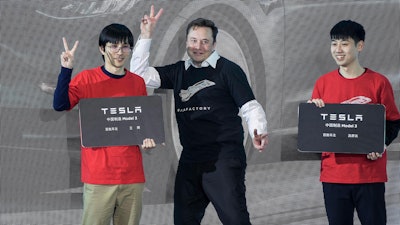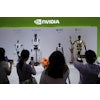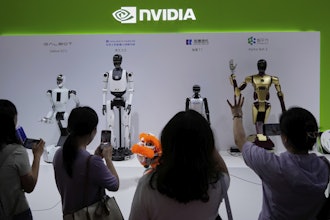
BEIJING (AP) — Elon Musk's ties to China through his role as electric car brand Tesla's biggest shareholder could add complexity to his bid to buy Twitter.
Other companies that want access to China give in to pressure to follow Beijing's positions on Taiwan and other issues. But Twitter is shut out by internet barriers that block most Chinese users from seeing global social media, which gives Beijing no leverage over the company, though the ruling Communist Party uses it to spread propaganda abroad.
Tesla Inc.’s ambitions in China might give Beijing that leverage to pressure Twitter to silence human rights activists and other critics or ease its rules on propaganda if Musk’s $44 billion purchase goes ahead, some experts suggest. Chinese customers bought half the Teslas sold last year. Its busiest factory and “main export hub” is in Shanghai.
“The Chinese exert tremendous leverage over businesses,” said Anne Stevenson-Yang of J Capital Research. “If you care about the Shanghai operation (of Tesla), then you’re going to put everything else in service to that.”
Musk says he sees “no indications” Beijing might use Tesla as leverage, but other companies don’t wait for government orders. Automakers, clothing brands and others take pre-emptive action to protect their access to China by changing marketing or products sold worldwide to reflect official positions such as the ruling party’s claim that self-ruled Taiwan is part of its territory.
Whether the Twitter deal will go ahead remains an open question. Musk tweeted Tuesday that it can't happen unless the company shows public proof that the number of Twitter accounts without real users behind them is below 5% of the total.
On Monday, he said at a business conference in Miami that a deal at a lower price wasn't “out of the question,” Bloomberg News reported. That supported suggestions by industry analysts that Musk wants out of the deal or a lower price due to a fall in the value of Tesla sock, some of which he has pledged to finance the purchase.
Trying to use an investor’s stake in one company to pressure a different company outside China would be a new tactic. But foreign investors know the ruling party is increasingly assertive about defending its “core interests” worldwide and attacks global brands even when that imposes costs on China and its public.
Officials have warned companies must “respect the feelings of the Chinese people” and avoid “eating Chinese rice while smashing Chinese bowls.”
A handful have given up opportunities in China to avoid cooperating with official censorship or surveillance or suffering a consumer backlash abroad over human rights or other issues. More common are companies such as hotel operator Marriott, which in 2018 fired an employee who “liked” a Twitter post praising a customer survey outside China that called Tibet a country.
Regulators can pressure automakers by blocking them from expanding output while ordering them to stay silent about the reason. More openly, state media have called for boycotts of Japanese, South Korean and other brands during disputes with their governments.
Tesla's sales in China rose 226% last year to 473,600 vehicles, according to LMC Automotive. That was about half of its 935,222 global deliveries.
Musk, who is Tesla’s chairman, was asked about the possibility the automaker might be used by Beijing as leverage over Twitter while appearing virtually at a May 11 event hosted by The Financial Times newspaper on the auto industry’s future.
“I’ve seen no indications to that effect,” Musk replied.
Musk said he expects China to be 25% to 30% of Tesla’s market in the long term.
The South African-born billionaire said he doesn’t see another Tesla factory in China in the near term but the company will expand in Shanghai.
The company, headquartered in Austin, Texas, didn’t respond to questions by email about its expansion plans.
Human rights activists criticized Tesla after it opened a showroom in Xinjiang in the northwest last year despite complaints of abuses against ethnic Muslim groups living there. The company isn't alone: Volkswagen AG operates a factory in the region and Chinese partners of other global brands have sales outlets there.
Musk says he wants to make Twitter a “politically neutral” forum for as much free speech as each country’s laws allow.
He hasn't said what he might do about Twitter's requirement that accounts of China’s state media and officials must be labelled “state-affiliated.” Scrapping that or curbs on inflammatory speech might make it easier for Beijing or other governments to influence American public opinion during elections.
A reporter for the official China Daily newspaper wants the tag dropped.
“Elon Musk should remove my label,” Chen Weihua wrote on Twitter on April 30. “This is totally discriminatory and suppression of free speech.”
Some companies fail to find a compromise between Chinese pressure and public outrage abroad over accusations of forced labor in Xinjiang and other abuses.
Last year, state media called for a boycott of Swedish clothing retailer H&M and other brands that stopped using cotton from Xinjiang. Most stuck to their position despite a hit to sales, possibly fearing bigger losses from a consumer backlash abroad.
Some companies don’t want to be seen to “carry the water for the government,” said Lester Ross, head of the Beijing office of Washington law firm WilmerHale.
China has the biggest population of internet users at just over 1 billion, according to official data. But most cannot see Twitter, other social media abroad and thousands of websites run by news outlets, human rights or pro-democracy activists and others.
China has its own popular but heavily censored social media. They are required to delete material deemed subversive or pornographic.
Sina Weibo, a Twitter-like microblog service, says it has 573 million active monthly users, or more than double Twitter's 229 million. Tencent's WeChat message service says 1.2 billion people use it every day.
Censorship has tightened steadily since President Xi Jinping took power in 2012.
Accounts run by support groups for young gays and lesbians have been closed. Complaints about food shortages when Shanghai was shut down to fight virus outbreaks were deleted.
In 2018, Tesla became the first foreign automaker to set up its own factory in China after ownership restrictions in the industry were scrapped. Until then, global automakers had to work through state-owned partners that assembled their vehicles.
Tesla’s honeymoon included access to subsidies for buyers of electrics and an exemption from sales tax. But when subsidies were extended in 2020 to help the industry through the pandemic, Tesla was excluded, while its closest Chinese rival, luxury electric brand NIO, remained eligible.
Musk is known for flamboyant gestures that include smoking marijuana during a radio interview. But he is alert to Chinese sensitivities.
He complained anti-virus measures in California disrupted Tesla production but said nothing in public after the shutdown of Shanghai forced his company's factory to close.






















